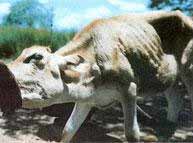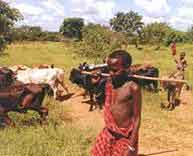This is the VOA Special English Agriculture Report.

Each year a million cows in Africa die from East Coast fever. The disease is spread by tick bites. Young cows are most at risk; they can die within days. Farmers and herders can lose up to half or more of their calves to East Coast fever.
The disease is widespread in 11 countries. And experts say it now threatens ten million more animals in new areas including southern Sudan.
Researchers first developed an experimental vaccine against East Coast fever 30 years ago. The vaccine works by a process called "infection and treatment." The animals are infected with whole parasites and treated with antibiotics at the same time. This keeps the disease from developing.
Controlling East Coast fever has meant a better life in areas that have gotten the vaccine. For example, the vaccine has been available to a group of Maasai herders in northern Tanzania for about seven years. They used to lose three-fourths of their newborn calves each year. Now, most survive. As a result, many people have extra cattle to sell, and use the money to pay for school for their children.

But making the vaccine more widely available -- especially in rural areas -- has been difficult. Farmers have been using supplies produced in the 1990s. Recently there was a shortage. The International Livestock Research Institute made one million doses at the request of African officials. But that supply is only temporary. Another problem is that the vaccine must be kept extremely cold.
Now, the nonprofit Global Alliance for Livestock Veterinary Medicines is trying to expand production and lower the cost. GALVmed spokesman Hameed Nuru says mobile phones have helped lower some barriers to distribution.
HAMEED NURU: "Now, with the advent of cellular technology, most of the people we do reach, such as the Maasai pastoralists, they all have cell phones. And they now call the delivery agent who can now come and meet them at a particular place and do the vaccination for them."
The vaccine is not cheap. But Hameed Nuru says the herders get together to sell a bull and use the money to vaccinate all their animals. They understand that they are getting value for their money: A cow is worth nearly twice as much if it is vaccinated.
A goal is to have local people develop businesses supplying the vaccine.
HAMEED NURU: "People are now seeing that they can actually make a business from supplying this vaccine and getting out to the very rural areas where there is a market for this."
The efforts are supported by the Bill and Melinda Gates Foundation and the British government.
And that's the VOA Special English Agriculture report, written by Jerilyn Watson with additional reporting by Steve Baragona. I'm Bob Doughty.
Related stories:
Understanding farm animals begins with a name
Cow genome could improve milk, beef production
When tuberculosis hits animals
Livestock disease spreads in Britain
(Source: VOA 英语点津编辑)